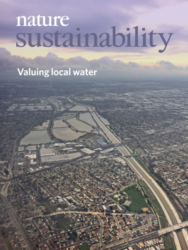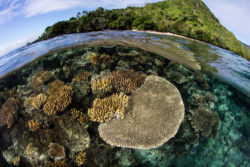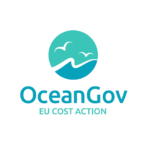On February 5, 2019, the Initiative for Sustainable Energy Policy at Johns Hopkins University’s School of Advanced International Studies will host a roundtable to launch a new report published by the Centre for International Governance Innovation (CIGI), entitled Ocean Climate Geoengineering: An Assessment of Potential Risks, Benefits and Governance.
Category: Biodiversity (incl. beyond national jurisdiction)
71 countries are negotiating a new biodiversity treaty. Here’s what you need to know.
Article in the Washington Post by Elizabeth Nyman, Elizabeth De Santo, Elizabeth Mendenhall, and Rachel Tiller (September 19, 2018) on the first round of negotiations for a new “international legally binding instrument … on the conservation and sustainable use of marine biological diversity of areas beyond national jurisdiction.”
Ocean science and policy

Editorial Ocean science and policy, Nature Sustainability, volume 1, page 261, 2018. Societal commitment to protect our seas has never been higher, but it will not succeed unless coordination across the various regulatory bodies involved is achieved.
Call for abstracts for an ISA panel on Ocean Governance issues

*UPDATE – ALL FILLED UP* The call for proposals for the International Studies Association conference, in Toronto March 27th-30th 2019, are out, and we are putting together at least one panel proposal on Ocean Governance issues – or on ” multi-level challenge of oceans governance in the Anthropocene” as the Task Force on Ocean Governance so eloquently phrases it. We would like to propose two panel, however, but to do that we need three more papers for […]
Article on the BBNJ treaty and Marine Litter

A new article on the BBNJ treaty as well as the challenge of marine litter in the form of plastic pollutions entitled “Ocean plastics and the BBNJ treaty – is plastic frightening enough to insert itself into the BBNJ treaty, or do we need to wait for a treaty of its own?” has been published OPEN ACCESS in the Journal of Environmental Studies and Sciences, doi: https://doi.org/10.1007/s13412-018-0495-4 ABSTRACT Marine litter, and plastics in particular, is fast […]
Budget earmarks $500m to mitigate Great Barrier Reef climate change
From The Guardian The Turnbull government will allocate $500m to mitigate the impacts of climate change on the Great Barrier Reef. The funding, to be unveiled on Sunday and confirmed in the May budget, follows a recent study finding that 30% of the reef’s corals died in a catastrophic nine-month marine heatwave in 2016. The government will partner with the Great Barrier Reef Foundation in a $444m agreement to tackle crown-of-thorns starfish, reduce pollution and […]
Great Barrier Reef saw huge losses from 2016 heatwave
One-third of reefs in the world’s largest coral system were transformed by warmed waters, finds comprehensive underwater and aerial survey. Extreme heat in 2016 damaged Australia’s Great Barrier Reef much more substantially than initial surveys indicated, according to ongoing studies that have tracked the health of the coral treasure. The heatwave caused massive bleaching of the corals that captured worldwide attention. In a paper published on 18 April in Nature, researchers report1 that severe bleaching […]
Bright lights shining on the horizon for the Brazilian Ocean Economy?
The Brazilian government calls its ocean the “Blue Amazon”, an immense Exclusive Economic Zone (EEZ) that is over 4 million km2 and encompasses nearly a third of the total marine and terrestrial area under national jurisdiction. The country has just announced the designation of the two largest Marine Protected Areas (MPAs) in the South Atlantic around remote oceanic archipelagos that are unique in their geological origin, with large endemism and a rich marine and insular […]
Professorship Opening in Marine Governance at Oldenburg University, Germany
The Alfred Wegener Institute, Helmholtz Centre for Polar and Marine Research (AWI) and the University of Oldenburg jointly founded the Helmholtz Institute for Functional Marine Biodiversity at the University of Oldenburg (HIFMB). For the establishment of HIFMB, we invite applications for a joint W3-professor position in Marine Governance. HIFMB develops the scientific basis for marine conservation and marine ecosystem management by analysing the functional role of biodiversity in marine ecosystem and understanding the general principles […]
Small-Scale Fisheries under Climate Change in the Pacific Islands Region
Marine Policy Vol 88 (February 2018; https://www.sciencedirect.com/journal/marine-policy/vol/88/suppl/C) features a special section on Small-Scale Fisheries under Climate Change in the Pacific Islands Region. The introductory article’s abstract reads: For Pacific Island communities, social change has always been a part of their socio-political lives, while environmental changes were always transient and reversible, so that they understood and engaged with their ocean as a provider for food, culture and life. However, recent unprecedented and irreversible changes brought on […]



Recent Comments